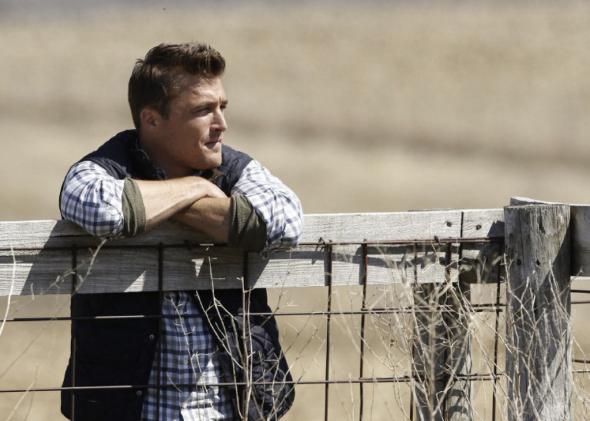In some ways, this season of The Bachelor has been just like other seasons. There have been boozy rose ceremonies and indiscriminate makeouts and theatrical panic attacks and the words “here for the right reasons” playing in an endless loop. Bachelor Chris Soules was a shoo-in for the role, a handsome, unreasonably stylish farmer with an aw-shucks vibe sure to strike at the heart of the show’s mid-American core demo. But in one particular way, there’s never been a Bachelor season like this one: Soules is from Arlington, Iowa, population around 400, and he made it clear from the start that he expected his bride to live there with him.
On tonight’s finale, Soules will propose to—or at least continue to date—either Whitney Bischoff or Becca Tilley. In contrast to previous seasons, Soules and his fiancée will not receive any questions from host Chris Harrison about where they will make a home or whose career will take priority. Soules’ mission is clear: to find a wife willing to relocate to his farm and make motherhood her job.
Previous Bachelors have, for the most part, been more geographically attractive to the spray-tanned, camera-ready types who tend to fill out the show’s female ranks. These Bachelors have had businesses and families in big, cosmopolitan cities, like Ben Flajnik in San Francisco, Brad Womack in Austin, and even Juan Pablo in Miami, whose location may have been the most appealing thing about him. None has been as adamant as Soules that he wouldn’t relocate for love. Soules himself was eliminated on the most recent season of The Bachelorette after Andi Dorfman visited Arlington and realized the limits of a future there.
So this season, Soules may be choosing the woman, but she is choosing Iowa, too. And so Arlington has become a major plot point. Soules has acknowledged his hometown as his “biggest insecurity.” He told one date that there are no jobs left in Arlington, and even the town bar has closed, because “technology has replaced people.” “It’s kind of sad,” he said. He knew that rural Iowa was a hard sell for women who chose to participate in a televised dating competition, and he proceeded with caution.
Soules dumped Ashley I., a woman most notable for her fake eyelashes, in part because he was skeptical of her desire to be a farmer’s wife. Ashley then spent her last moments on the show casting similar suspicions on castmate Britt, who applied lipstick before bed each night just in case a camera alighted on her while she slept. During the next episode, Britt and a few other contestants decided they must see Arlington for themselves, without Soules. Their road trip began with raucous cheers of excitement and ended with awkward silence and gaping mouths as the ladies discovered that the town had no restaurants.
The Iowa element has certainly given the show a strange new tint. But I’ve found it, on the whole, to be a refreshing wrench in the Bachelor format. Rather than presenting a beautiful, postcard version of American farm life, the show stumbled into America’s jobless, post-industrial wasteland. And the fact that the Bachelor’s main insecurity could be manifested as a real place has made for pretty great TV. The faces of the women as they drove around his sad little windswept town might as well have been their faces as he told them his darkest, most embarrassing secret. Iowa has stirred up even more tension between the contestants than usual because any slight Arlington diss could be interpreted as “not being there for Chris,” one of the cardinal Bachelor sins.
One of the show’s fascinating threads, at least to diehard Bachelor fans like myself, is its rigid adherence to old-school courtship structures despite the modern human beings who populate its cast. This is, needless to say, a world of “fantasy suites” and “amazing journeys” where only men may propose with diamond rings on bended knee. The “Prince Farming” package—pastoral, single-earner household—made a natural fit for a series reliant on retro fairy-tale tropes. Recent bachelorettes have included Dorfman, an attorney, Ashley Hebert, a pediatric dentist, and Ali Fedotowsky, an account manager at Facebook, but per the show’s fundamental ideology, they all maintained that only marriage would bring happiness and fulfillment.
Still, Iowa forced the show to clear away some of the happy-go-lucky haze that has historically clouded its conversations about relationship logistics. Whitney has already declared that becoming Mrs. Soules will trump her hard-earned career as a fertility nurse. Becca is less certain and may lose the rose and the ring as a result. It’s a real, contemporary tension the likes of which this rose-tinted show generally does not address. Going into tonight’s finale, the implausibility of ABC’s fairy tale has never been more apparent: winning this season will not result in a princess life, but in the less glamorous realities of being a midwestern farmer’s wife. Bizarre a subplot as it has been, Iowa finally brought The Bachelor down to earth.
